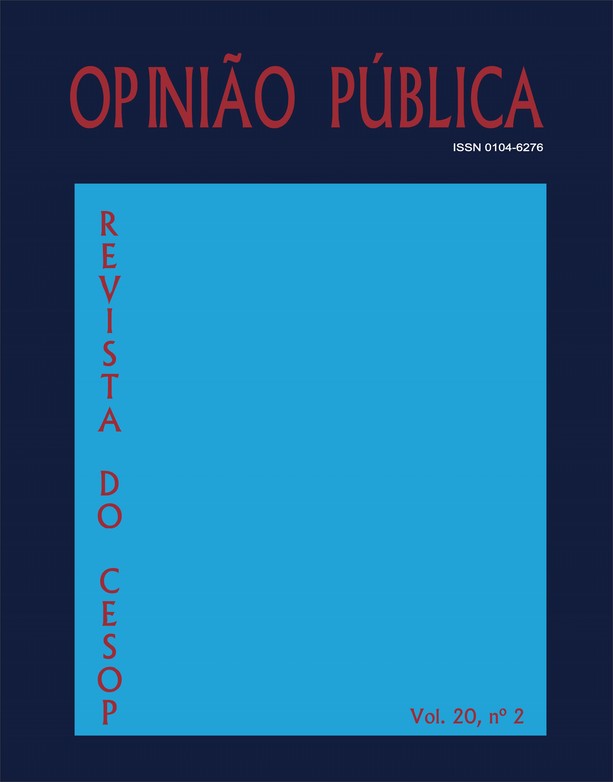Opinião Pública – Vol. 20, Nº 2 2014
Articles in this issue
Author: Fernando Guarnieri
In this article I use the Unified Model of Vote from Adams, Merrill and Grofman (2005) to better understand the role of party strategies and party identification in the voter decision. I use the NOPP algorithm, derived from the work of Adams et al, and data from the ESEB to check the strategies adopted by the candidates in the last three presidential elections in Brazil. While this model provided a good approximation of the position of the PSDB candidates and other parties that were positioned more to the center and right it was not very precise in positioning the PT candidates and other parties that are positioned more to the left. This indicates that these parties move less by maximizing votes than by other factors.
Authors: Francisco Paulo Jamil Almeida Marques, Jakson Alves de Aquino e Edna Miola
The article reflects on how members of the Brazilian House of Representatives use Twitter as part of their political communications strategy. We examine all the 463 official accounts registered on Twitter in order to understand the factors that lead legislators to invest in microblogging. Such accounts were weekly monitored (between February and July 2012) by using the statistical software “R”. The results points out correlations between the use of Twitter and attributes like age and occupation of leadership positions.
Authors: Flávia Biroli e Denise Mantovani
This article analyses the role of one of the main Brazilian newspapers, Folha de S. Paulo , in the understanding of Penal Action 470 - the judgment by Brazilian supreme court of important members of Brazilian Workers’ Party for their involvement in corruption during the first government of Lula da Silva. It discusses the relationship between press and PT in Brazil and, also, the way plurality is organized in Brazilian political journalism. In the news here discussed, plurality equals guarantees for a restricted defense of some individuals in face of the narrative that organizes the coverage. While a circumscribed defense is presented as self-interested, that narrative is presented as nonpartisan and stuck to the facts. The angle presented as legitimate in the news is naturalized while conflicting positions are excluded or domesticated as reactions to the facts. Partisanship has its expression, then, in the prevalence of the moral dimension of politics.
Author: Natália Guimarães Duarte Sátyro
The objective of this paper is to show the existence of different worlds of welfare in Brazil. We suggest that as the existence of distinct worlds of welfare across Brazilian states as a fundamental change in welfare after the 1988 Constitution. The conclusion is the discrepancy between the worlds of welfare found between states allows us to say that in Brazil there are distinct categories of citizens, with differentiated access to basic services. We also show that states have different legacies and therefore different trajectories in the three decades analyzed, but there is a trend towards convergence in welfare. This heterogeneity is reflected in distinct patterns of social welfare. For this, the methodology used was basically a descriptive analysis based in time series and cluster analyses.
Author: Rafael da Silva
Among the studies on the Participatory Budgeting (PB) impacts, a line of research has shown its redistributive potential, comprehending it as the consolidation of equality and the difference principle, framework elements of the conception of justice, by John Rawls. Therefore, this article aimes to verify if this potential was achieved in the PB experience of the city of Biguaçu in Santa Catarina, Brazil. The study proves through cross tabulation of the per capita investiment and the Social Vulnerability Index (SoVI) per region, that, in part, the experience promoted justice. However, this promotion was limited by the changes in the institutional design of the experience, which caused a direct impact on the equality reduction.
Author: Alessandro Freire
Social capital theory emphasizes interpersonal trust as a facilitator of cooperation among individuals, crucial for the formation of autonomous associations within civil society and for the engagement of citizens in public affairs. Despite the importance of trust for the concept of social capital, recent empirical research has been demonstrating that its effect on civic participation is weak, at best. This paper suggests an interactive model, where the effect of trust is conditioned by motivational aspects of participation (expectations of benefits and perceptions of costs). Using data from the 2005 British Election Study (BES), a survey conducted in the United Kingdom, I test the conditional effect of interpersonal trust on individuals’ willingness to engage in different types of collective action. The findings point to a conditional effect of trust that varies not only according to motivation variables, but also depending on the type of engagement.
Authors: Rossana Rocha Reis, Tainah Espíndola e Aureo de Toledo Gomes
Using Norman Fairclough ́s Critical Discourse Analysis , this article aims at analyzing U.S. foreign policy under George W. Bush (2001-2008). Therefore, after the reading of official documents, we intend to study the discursive construction of new threats against the United States, with particular focus on three issues: first, the construction of identities around transnational terrorism and the so-called failed states; secondly, the reception and reproduction of this discourse and how these specific meanings affected U.S. political action; and how these elements are connected to the strategies of U.S foreign policy in the post- Cold War era. Finally, concerning theoretical and methodological issues, we expect to underline the potential of Critical Discourse Analysis to the study of International Relations.
